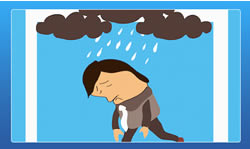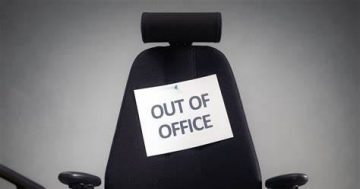Michelle Gibbings says everyone has bad days, but it is up to the individual whether they wallow in them or find a way to move through them.
 You miss an important meeting. Your plane is cancelled. You lose a key document when your computer crashes.
You miss an important meeting. Your plane is cancelled. You lose a key document when your computer crashes.
You miss out on a major deal. The list could go on.
Bad days are the days when nothing seems to go to plan. We all have them.
When you think about it for a moment, there’s an upside to having a bad day.
If every day went perfectly, you’d never notice the good days.
You’d never pay attention and feel exhilarated when things go well.
Instead, the good (and even great) days would fade into the background, blurring into all the other days.
Contrast matters.
We are often told focus on being positive, optimistic and happy.
Yet, it is the whole range of emotions that make us human.
All the feelings — the good, bad and the ugly — are an important part of life.
When you try and shy away from them you are denying the existence of a feeling that is valid.
Curiously, there’s even research which suggests that having a bad day at work can help other people around you.
The argument here is that it leads to new social connections.
I’m not so sure about that.
From my experience, negativity is contagious and so your negativity and wallowing in your bad day can (and often does) bring those around you down too.
You don’t want to ruminate. Instead you want to recognise that when you have a bad day there are choices to be made.
The first starts with acknowledging that your day ‘kinda sucks’.
Secondly, accepting that you have a choice about what you want to do about the bad day — wallow in it, or find a way to move through it.
Thirdly, taking action in a way that is meaningful and helpful.
When you get to the third step, here are some ideas that will help you shift how you are feeling.
Get physical:
Exercise and moving helps to shift your state, releasing the brain’s happy chemicals.
Talk it out:
Either verbally with a friend or write it down.
It’s important to get how you are feeling out of your head so that it doesn’t become a point of rumination.
Shift your space:
Go outdoors, seek out music, or find a natural environment.
Any action you take to change the environment in which are in will help to shift your perspective.
Find a furry friend:
Patting a dog, watching a dog run around the park or any other activity that puts you in touch with an animal can help as it sparks moments of joy.
Breathe:
Remember to slow down and breathe.
When you are stressed and anxious you typically take shorter and sharper breaths.
To slow your mind down, you need to slow your breathing down.
Be grateful for what is:
When you reflect on what you have it is easier to realise that the bad day is usually temporary, and you have so much to be thankful for.
As you do this heed the words of the poet Rumi: Live life as if everything is rigged in your favour.
The choice is yours to ignore or pursue. What will your choice be?
*Michelle Gibbings is the Melbourne-based founder of Change Meridian who works with leaders and teams to help them get fit for the future of work. She can be contacted at [email protected]
This article first appeared at www.changemeridian.com.au











